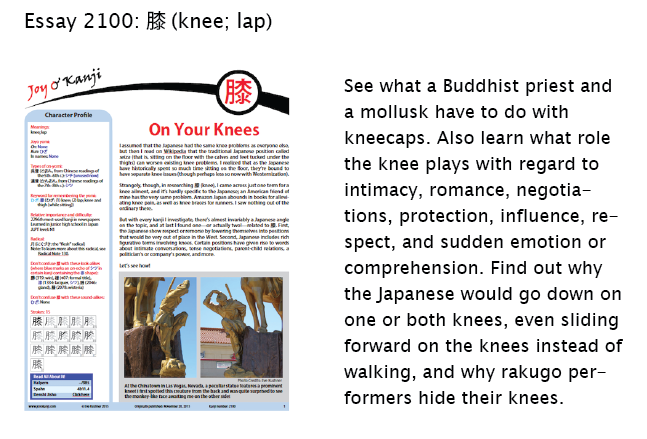A Trio of Surprises
Today I bring you a grab bag of recent surprises.
Conveying Contempt
Two blogs ago, I quizzed you on a word that turned out to have this definition:
腐れ縁 (くされえん: unhappy yet inseparable relation; fatal bonds) rotten + relations
Behind the scenes, my proofreader told me this: "Dictionaries say that the 腐れ in 腐れ縁 indicates the narrator's contempt, abuse, or ridicule. They have a few more examples, which are 腐れ金 (くされがね: fucking money), 腐れ尼 (くされあま: bitch, whore), and 腐れ儒者 (くされじゅしゃ: fucking Confucian)."
What?! Who refers to money that way? If 尼 means "nun," how did it end up in a word as awful as 腐れ尼? And what does anyone have against Confucius or his followers?
Breen defines 腐れ金 as "paltry sum of money." Ah, that makes more sense. In essay 1916 on 涙 (tears; small amount), I wrote about terms of contempt for payments so small as to be useless, so that serves as helpful context for 腐れ金.
I can also imagine the idea behind 腐れ尼; it must be that a bitch or whore is a nun gone bad. That seems a bit harsh! We're not all cut out for the nunnery! Oops, no, I'm wrong about all this. When 尼 stands alone, it can be a term of hatred for any woman, as in この尼! (You bitch!). The 腐れ emphasizes the hatred.
As for the "fucking Confucian" thing, 腐れ儒者 isn't about Confucians in general but rather about a scumbag who happens to be a Confucian. That's a very specific insult to hurl!
3 + Sun + Moon
Next up, what do you think this term could mean?
三日月 (みかづき) 3 + sun + moon
a. third day of a month
b. third Sunday and Monday of a month
c. Earth, the sun, and the moon as a trio
d. crescent moon
I'll block the answer with a preview of the newest essay:

Here's the answer:
d. 三日月 (みかづき: 3 + sun + moon) means "crescent moon" or "new moon." Several things surprise me here:
• Given that 三日 (third day of the month; three days) has the yomi みっか, it's intriguing that we can read the 三日 in 三日月 as みか.
• English speakers differentiate a "new moon" from a "crescent moon," as I've confirmed on one site, so it's odd to seem them lumped together this way.
• Does the crescent actually come on the 3rd day? I checked it out. One calendar shows that if the new moon comes on the 8th of a month, the moon on the 11th is definitely a crescent. But couldn't we also use that term for the images on the 10th, 12th, and 13th?
• I notice that 三日月 is a one-of-a-kind word when it comes to describing the 月相 (げっそう: lunar phases). That is, you can't swap in other numbers and come up with real phase names.
• I found 三日月 as the root of a few more terms:
三日月形 (みかづきがた: crescent shape)
三日月眉 (みかづきまゆ: arched eyebrows)
三日月湖 (みかづきこ: oxbow lake; billabong)
The first two are fun and logical, and the third has me lost. Oh ... "billabong" is an Aussie word, which I guessed because of the brand name and the sound. But still, that doesn't help.
Ah, this does. An "oxbow lake" is a U-shaped body of water or a similarly shaped bend in a river or stream. What fun! They've abstracted the idea of a crescent from a moon and applied it to water.
As for the term "oxbow," that represents another creative leap. "Oxbow" refers to the U-shaped collar around an ox's neck, a piece that holds a yoke in place. Some poetic soul decided to use the term figuratively for hairpin turns!
Perhaps the biggest surprise here is that three kanji as simple as 三, 日, and 月 have taken us to such unexpected places!
The Key to a Good Life
I could and probably should stop here, but 三 seems to be the magic number right now, and just because bad things come in threes doesn't mean that kanji surprises can't also form trios!
The third one came from essay 2100 (which held many surprises for me). See if you can translate this book subtitle:
「立つ、座る、歩く、人生の晩年は、膝で決まる」
立つ (たつ: to stand); 座る (すわる: to sit); 歩く (あるく: to walk);
人生 (じんせい: life); 晩年 (ばんねん: (one’s) last years);
膝 (ひざ: knee); 決まる (きまる: to determine)
I struggled with it, but my proofreader came up with this:
「立つ、座る、歩く、人生の晩年は、膝で決まる」
Standing, Sitting, or Walking: The Knee as the Key to a Good Life in Your Later Years
The key? Where is there a key?
As I learned, 決まる corresponds to "the key" part. So should we look at the verb 決まる and think of it as a noun? No, that's not how it works. We can conceive of the title this way: "The knee as the thing that determines whether you can stand, sit, and walk in very old age." That is, 膝で決まる literally means "something is determined via the knee" or "the knee decides"!
I liked the earlier leaps better! Have a great weekend!

Comments